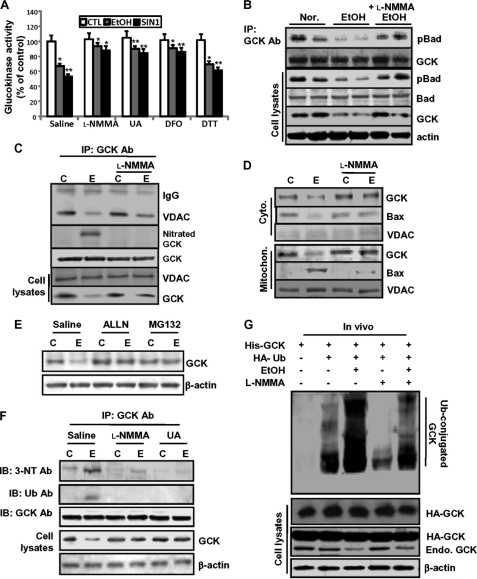FIGURE 8.
Ethanol-induced GCK nitration inhibits GCK activity and enhances the susceptibility to ubiquitination and results in degradation. A, effects of peroxynitirite scavengers (l-NMMA, UA, and deferoxamine (DFO)) and DTT, an S-nitrosylation inhibitor, on GCK inactivation induced in ethanol or SIN-1-treated islet cells. The data are expressed as mean percentages ± S.E. of glucokinase activity (control = 100.5 ± 17 pmol/h·islet); n = 6 experiments. *, p < 0.01; **, p < 0.05). B, effects of ethanol-generated peroxynitrite on GCK-pBad interaction. C, effects of ethanol-generated peroxynitrite on GCK-VDAC interaction. C, non-treated control; E, ethanol-treated group. D, effects of ethanol-generated peroxynitrite on GCK mitochondrial translocation. E, GCK down-regulation following ethanol treatment was due to proteasomal degradation. The cells were treated with ethanol in the presence or absence of the proteasome inhibitors, acetyl-leucyl-leucyl-norleucinal (ALLN, 50 μm) and MG-132 (10 μm). F, after treatment with ethanol in the presence or absence of l-NMMA or UA, immunoprecipitated GCK was subjected to Western blotting for nitrated and ubiquitinated GCK using anti-nitrotyrosine and anti-polyubiquitin (FK-1) antibodies. G, in vivo ubiquitination. The cells were transiently cotransfected with the indicated combinations of expression plasmids and treated with MG132. Ubiquitinated products were recovered on nickel-agarose beads and separated by SDS-PAGE, followed by immunoblotting with anti-HA antibody (right). All of the results were obtained from three independent experiments. CTL, control; IP, immunoprecipitation; IB, immunoblot; Ab, antibody; Mitochon., mitochondrial; Nor., normal control; Cyto., cytoplasm.

